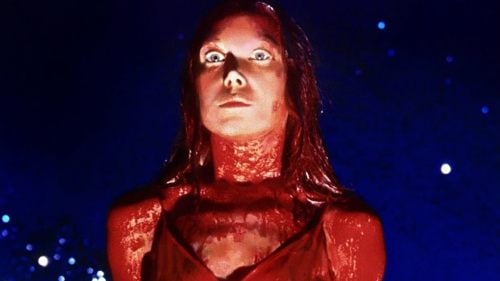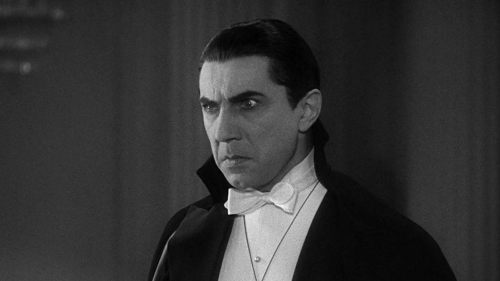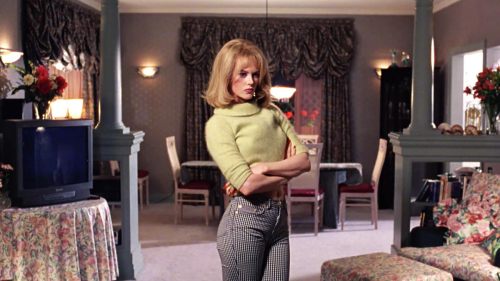Fantastic Fest Review: DESTROYER Plays Like Art House POINT BREAK
Karyn Kusama's tiny horror picture The Invitation is a powder keg: a visual rumination on the lasting lacerations of grief and trauma, and how individuals cope with them, wrapped up in a formally precise genre veneer. After a couple attend a dinner party, they discover that a select few guests have fallen under the tutelage of a mysterious cult leader, harboring nefarious intentions towards their ostensible old friends. The Invitation demands viewers bring their own personal baggage to the cinematic table and examine how they've dealt with spiritual devastations in the past. In short, it's utterly brilliant, and announced the Jennifer's Body director (not to mention writing/producing duo Phil Hay and Matt Manfredi) as a re-emerging talent to keep an eye on.
With Destroyer, Kusama, Hay and Manfredi follow up that left field critical darling with a companion piece of sorts, once again probing how the devastating nature of defeat and the impotent rage it spawns can rewire a human being for the rest of their lives. Yet instead of packaging these weighty themes inside a single-location thriller, the trio instead deliver a throwback "cop on the edge" mystery in the William Friedkin mold. Centered on a brooding, mutated Nicole Kidman (under odd-fitting wigs and layers of craggy make up), we watch as her burnt-out California detective Erin Bell tries to right the greatest wrong of her past: a transgression she's carried around with her for seventeen years like an anchor, while the remainder of her life was washed away via a tsunami of bad decisions.
In a sense, Destroyer almost plays like an art house iteration of Kathryn Bigelow’s adrenalin-shooting classic Point Break, except we don't get to take surfing lessons with Keanu Reeves. In his place is Det. Bell, whose story transpires years after she was embedded inside a cultish cadre of bank robbers, headed by the mysterious Silas (Toby Kebbell). The major heist she was present for went very, very bad, scattering the surviving players to the wind and placing a few behind bars. Now, a fresh body with a collection of dye-pack-stained bills inspires Erin's sojourn into the past, as she suddenly senses that Silas has returned to LA after nearly two decades of silence, and it's time for her to finally get even for whatever harm he caused her and her suspiciously absent partner Chris (Sebastian Stan) during their time together.
Comparisons to True Detective are practically inevitable, both because of Hay and Manfredi’s twisty screenplay structure – alternating between two time periods, we encounter shady characters from Erin's past as she pursues them in the present – and also because of its oppressively portentous tone. Where The Invitation at least had moments of dry humor to break up its ominous proceedings, almost none of that levity is present in Destroyer (except for Bradley Whitford's janky criminal attorney, who almost feels beamed in from a different picture). This is "serious" cinema, the same way Nic Pizzolatto's anthology series is "prestigious" television, and that tonal droning can become taxing, even if the movie's compact two hours move at a steady pace (thanks to judicious cutting from editor Plummy Tucker).
There are also narrative/thematic threads woven into Destroyer’s bleached fabric that don't seem fully developed, as if we're watching a season of television crammed into 124 minutes. A viewer could almost imagine each encounter Erin has with a new player from her past as an hour-long episode, where we actually get to learn who these people are, what makes them tick, and (most importantly) how they ended up in this cultish heist crew. Instead, we're treated to a mostly uninteresting subplot revolving around the detective's sad, estranged husband (Scoot McNairy), daughter (Jade Pettyjohn) and the sixteen-year-old girl's lecherous twenty-something boyfriend (Beau Knapp). Think the Diane Venora/Natalie Portman portions of Heat, only without Michael Mann's acute attention to emotional shorthand.
The spirit of Charles Manson has peculiarly hovered over Kusama, Hay and Manfredi's two collaborations. With The Invitation, the references seem overt: the LA hills turning bloody, thanks to a cult leader's orders, complete with a participant named Sadie (Lindsay Burdge). In Destroyer, we're placed in the period of Manson's outlaw days, where Silas' followers all congregate together in dirty, off the grid spots straight out of an Alice In Chains video to drink, fuck, do blow, and eventually do a job together. However, where The Invitation allowed us to understand its enigmatic figure's allure – his communion doubling as therapy for the devoted – we never get to comprehend how this bandito is able to hold sway over his flock. Sure, there's a tense Russian roulette scene illustrating how deeply rooted his influence is, but the source of that power isn't explored to any meaningful extent.
Thankfully, even when we're left wanting more motivation and back-story, Kusama – with the aid of the movie's true MVP, cinematographer Julie Kirkwood (The Blackcoat's Daughter) – immerses us in this back alley world where we can feel the hot California sun scorching our faces. Kusama's Los Angeles is one of hard stone and bright lights, viewed from Erin's unmarked squad car under bridges or outside banks before stopping on a hill (during the middle of a foot chase) to stare out over a night skyline of glittering fluorescents. Destroyer joins this year's Den of Thieves as a picture that's heightened by its location work, exploring the seedier side of a city that isn't normally projected onto the big screen. From every objectively measurable technical perspective, the movie's a marvel.
Still, despite Destroyer's haunting final images, it's hard not to feel mildly unfulfilled by the time the end credits roll. Although Kidman completely disappears into her role (definitely expect awards talk as we head into Oscar season) and the movie is layered with convincingly gritty affectation, it fails to interrogate the transformative power of anger and guilt as thoroughly as its predecessor did. By no means is this meant to indicate that Destroyer is a bad motion picture, but rather a solidly constructed misfire. In fairness, this writer's expectations may have been set a notch too high, as The Invitation is a near-perfect work of scare cinema manufactured with limited resources. Hoping that Kusama, Hay and Manfredi could replicate those results with equal apparent ease was probably foolish, but Destroyer’s failings aren't due to a lack of ambition. Rather, you wish this mystery opted to give itself a little more room to breathe, so that we could luxuriate in all of its melancholy criminality and understand its perps' impulses a touch easier.



